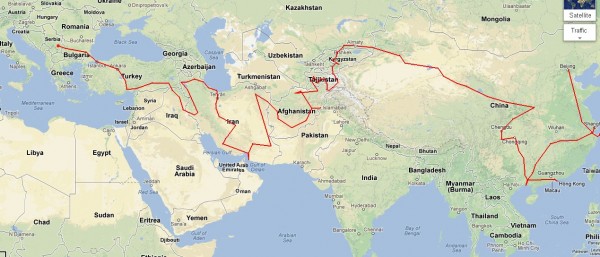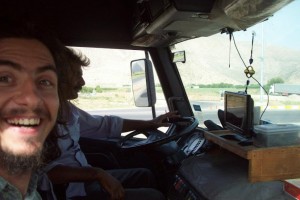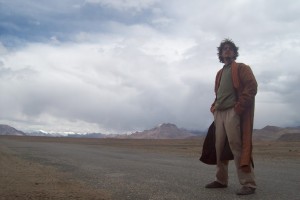Nenad is a 29-year-old self-described “couchsurfing drifter” who recently completed a five-month, 25,000km hitchhiking odyssey from his home in Serbia to China. An official Couchsurfing Ambassador, he has hosted 182 guests and surfed 253 couches on three continents. On his recent trip across Asia, he was detained twice on suspicion of being a terrorist. He is also a really friendly guy. This is his story.
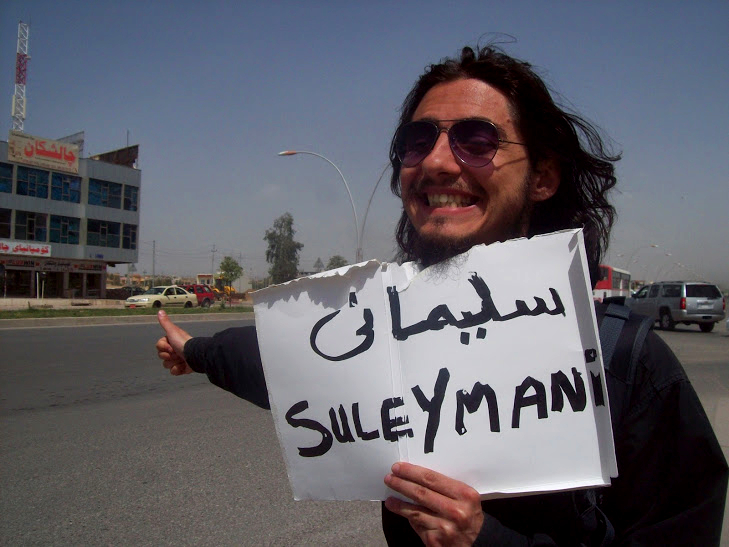

I MET NENAD STOJANOVIC randomly through couchsurfing.org, when the site informed me that he would soon be passing through Beijing. I clicked on his profile page, scanned his rather impressive travel resume, and offered to show him around the city while he was here. I ended up interviewing him at a Beijing café.
A gaunt figure with a red Young Pioneer-style scarf wrapped around his neck, he resembled a less intense, Eastern European version of Che Guevera. Weary from his cross-continental hitchhiking trip, but still upbeat, he spoke positively of everyone he encountered, happily recounting their acts of kindness and charity. He has been on the road, or hosting others on the road, for five years. The café was a rest stop on his latest journey from Serbia to China.
His traveling career was launched when he discovered couchsurfing, which he said, “motivated me to connect with neighbors and neighbors of neighbors.”
At various points in his story, Nenad mentioned the unorthodox venues he has “surfed,” as casually as if he were describing what he had for breakfast. An Afghan police station. A Chinese expressway toll plaza. A potato truck in Tajikistan. A Turkish furniture store. The home of some Taliban members. Speaking to him, I got the distinct impression that he was navigating a fine line between exhilarating optimism and joyous madness, a latter-day messiah of the highway, intent on uniting humanity through travel and sharing tales of kindness far and wide.
On his hitchhiking journey from Serbia to China, he used the couchsurfing website to arrange hosts in each city or town he visited and just improvised when no host could be located. He hitchhiked the entire 25,000km, with the exception of a bus ride through the hazardous Afghan interior. He described Turkey thus:
- “It’s very easy to hitchhike there. Drivers are not choosing you; it’s you who chooses your driver. I didn’t have a host when I reached the town of Nevşehir in central Turkey. I found a furniture store and used hand signals to ask the manager whether I could sleep there. I stayed there for a little while until he just invited me to spend the night at his home. He served me tea and provided a meal.”
He continued hitching and surfing through Turkey and decided to pass through northern Iraq. He crossed the border in a van with a troupe of Turkish comedians, magicians, and belly dancers, who invited him to stay at the hotel in Iraq they were performing at.
- “This was in the Kurdish part of Iraq. It’s not really an insecure area now, though there were scars of war, with destroyed buildings and bad memories. Everyone was extremely nice and hospitable. Moving on, I skipped Mosul because it was too dangerous.”
He managed to hitchhike through Iraq by displaying a sign in Arabic to passing drivers, written by one of his hosts.
Hitchhiking in Iran presented difficulties, as locals never see tourists in some areas.
- “I would be surrounded by locals wherever I went, to the point where roads were blocked by the crowds. Some soldiers showed up and ordered a passing bus to give me a ride to the next town. Nobody understands what hitchhiking is, so when somebody does give you a ride, they feel responsible for you. One of my rides actually called the police to make sure my couchsurfing hosts were not dangerous. Some people there don’t really trust each other, but they’re really nice. Amazing.”
The trip onward led through Afghanistan, and not even the prospect of traveling through an active war zone could temper his enthusiasm.
- “I wanted to do this trip overland. I tried to get a visa for Pakistan but it took too long. Then I decided to pay a visit to the Afghan embassy in Tehran, Iran. The consul was a really nice, friendly guy and I figured the country mustn’t be so bad. He gave me a visa right away after confirming my identity.”
After arriving in the western Afghanistan city of Herat, he became acquainted with some local members of the Taliban, whom he described as “actually really nice people.” Their mutual acquaintance operates a farm on Taliban territory, so they were happy to host him and provide advice to ensure his safe passage. Nenad thus joined the paltry ranks of Westerners who encountered the Taliban without incident.
Life with the Taliban was simple enough. The men would sit and smoke in the living room and then food would just magically appear, prepared by unseen women working in the kitchen.
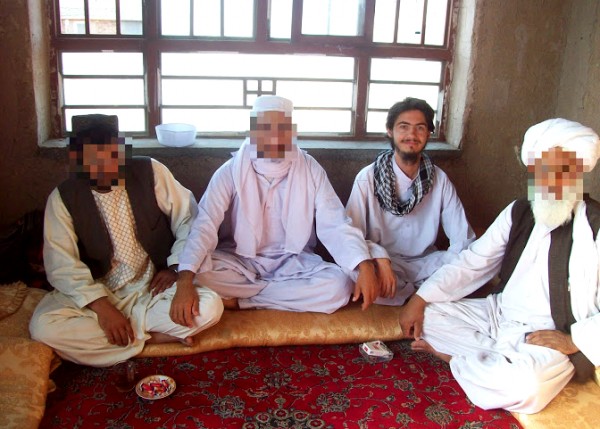
Couchsurfing with local Taliban members in Herat, Afghanistan
They explained to him, through the mutual friend, that they happen to disagree with current politics and laws in Afghanistan, which is why they choose to be members. They claimed they were not terrorists, just people with different political opinions to those elsewhere in the country. They didn’t go into further detail and Nenad did not notice any weapons in their home. In addition to providing some tips on how to behave in rural environments, they suggested he use a particular bus company that doesn’t get stopped so often at the myriad highway checkpoints throughout the country.
- “They were friendly and hospitable people. Not all Taliban are terrorists. I suppose you never hear anything positive about them, but my experience was. They told me I looked like one of them, which I guess was a compliment.”
Before setting out, he reviewed each of the three main overland routes through Afghanistan. Hitchhiking through the south and central parts of the country was out of the question, though a bus trip was not much safer due to the possibility that he would be kidnapped and held for ransom. Additional hazards included land mines, roadside bombs, and bandits. He did consider hitching a ride on a US consulate helicopter, but was unceremoniously turned away after being informed that they were not a taxi service.
The roads linking the major cities were of greatest concern.
- “In the bigger cities, it’s okay to speak in English, as many people can understand. But when you’re on those roads, you never know what’s going to happen. Afghanistan can seem like the safest place in the world, until something happens.”
The north road from Herat to Mazar-i-Sharif had recently been taken over by the Taliban. The central road was in really poor condition, would take four days to cross, and many foreigners had been killed there. The south road, dubbed one of the most dangerous in the world, leads south from Herat, passes through Kandahar, and then on to Kabul, the capital. He chose the southern road on the basis that it carries the most traffic of the three and therefore should be the safest. One of his Iranian hosts had actually been robbed at gunpoint on this road, losing his passport and valuables. Safety in Afghanistan is a relative term.
He explained his Afghan survival strategy as follows:
- “I figured if I looked like a local while traveling through the danger zone, my chances of being killed were only 30%,” his voice rising comically. “My hosts told me many people take this road, so I had to disguise myself on this one busy, but dangerous, road so I didn’t get kidnapped.”
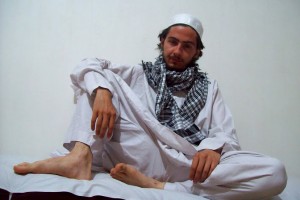
In disguise for his trip across Afghanistan
His disguise consisted of a white shalwar kameez (traditional Afghan clothing) and a taqiyah (cap for observant Muslims). The clothing was provided by his couchsurfing hosts, who also taught him how to pray to Mecca, should the need arise. In Case of Emergency, Pray.
With so many ethnic groups in Afghanistan, some locals do indeed resemble those from southern Europe, while others look central Asian. He also sported the long beard that is de rigueur among more traditional Muslim men. “I have this kind of ‘Afghan Look,’” he concluded.
Decked out in Afghan apparel and suitably indoctrinated, there was but one missing piece in his disguise — the local language. To get around this tricky obstacle, he pretended to be deaf and mute while in dangerous areas, resorting to hand signals to communicate with any locals he encountered. He also hid his backpack in a large smelly sack, along with his valuables.
Onward he went, a deaf mute faux-Muslim passenger on the Taliban-recommended bus, headed down one of the most dangerous roads in one of the most dangerous countries in the world. As the bus traveled southwest from Herat to Kandahar, then north to Kabul, he
- “…slept or pretended to sleep. The bus was hot and horrible and the driver drove like a maniac. The scenery was nothing special and there were many destroyed bridges and buildings. We stopped to pray a few times and went through several Taliban and police checkpoints. Eventually I arrived in Kabul and my host couldn’t believe I had actually traveled by land.”
After the hot and torturous overland journey, he likened his week-long stay in Kabul to a “summer vacation.”
- “Kabul feels like a city from the 16th century. Everything is everywhere and it’s all random. You smell fruits, vegetables, animal blood, dust, dirt, spices, sweat, and toilets. People walk around like they exist in a fairy tale with these long beards. Animals are being slaughtered in front of you and blood is going everywhere.”
His first encounter with the authorities, at a checkpoint in the northern Afghan town of Kunduz, did not go well. The checkpoint officer thought he looked like a terrorist, so he was forced to spend the night at a police station.
Fortunately for him, the station was fairly relaxed and he was not asked to stay in a cell. He surfed the station couch for the evening and was interrogated the following day. The interrogating officers quickly realized he wasn’t a terrorist and, feeling guilty, they offered him plenty of candy and a huge traditional Afghan coat as a present.
Ironically, he observed no gunfire, terrorist activity, or robberies while crossing the length and breadth of the country and was only robbed immediately after leaving Afghanistan, in the relatively safe neighboring country of Tajikistan. While walking on the street in the Tajik capital of Dushanbe, he was approached by a “KGB agent” who planted heroin in his backpack and demanded a hefty bribe, threatening to throw him in prison unless it was paid immediately. Freedom was his for only 80 euros.
He spent a day selling potatoes with one of his rides and then moved on to the Pamir Mountains, a remote area in the eastern part of the country.
- “The Pamir Highway is one of, if not the most deserted highways in Asia. It took me almost a week to hitchhike there, averaging 200km a day. I felt like I was on another planet. Just nothing out there. I would wait four or five hours for a single car to come by.”
While in the Kyrgyz city of Osh, he left his backpack at a café for a few hours, which resulted in a bomb scare and local evacuation. Once again, he found himself at a police station being interrogated by the counterterrorism unit, who, to his amusement, found some Afghan postcards featuring guns and bombs in his backpack. They let him go after two hours.
He was enthusiastic about his experience in China, which has involved hitchhiking 10,000km across two dozen provinces.
- “Drivers are nice and curious and they always insist on buying meals for me. They never ask for money.”
While traveling from Hong Kong to Guangxi province, one of his rides took him to a ten-year reunion party for players from a Counter Strike team. Counter Strike is an online first-person shooter game.
- “They were all wearing ‘Counter Strike’ t-shirts and we got drunk and had a food fight.”
One of his more memorable China experiences was at an expressway toll plaza near Shanghai. After arriving there at 2am, he asked management if he could spend the night on their couch, which they agreed to. The following morning, a local journalist came out to interview him and toll gate management asked him to record an English welcome message for drivers entering the expressway:
“Dear drivers, welcome to the Beijing-Shanghai Expressway.”
It is only fitting that a hero of the road should be the one to announce the journey to fellow travelers.
Now temporarily settled in a suburb of Hangzhou, China, Nenad has taken a job teaching English to children. He may just be the only kindergarten teacher worldwide that was once suspected of being a terrorist. His next move, like the meaning of his name (Ненад), will certainly be unexpected.
